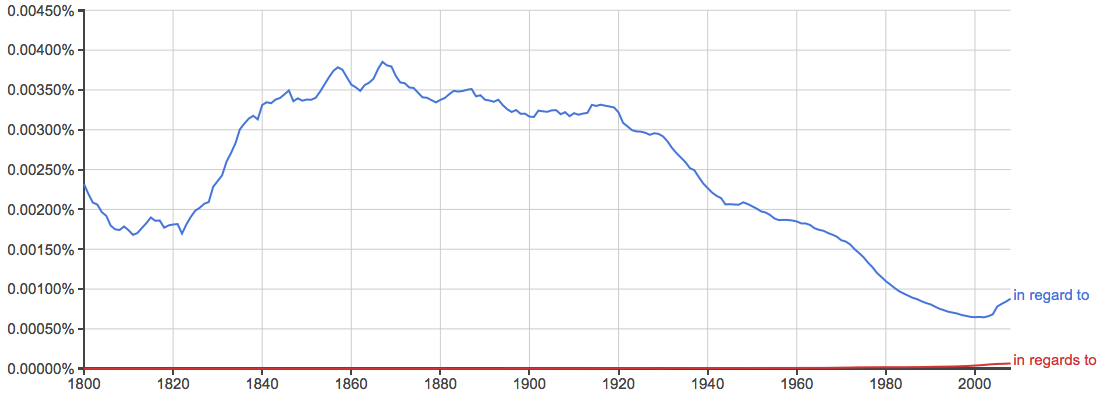English has many phrases that function the same as individual parts of speech. And even among such phrases, there are many variations, some of which are as simple as pluralizing: in regard to or in regards to.
Should you ever use these phrases in your own writing? They sound nice, but often, a simpler alternative does the same job in fewer words.
Let’s examine each.
What is the Difference Between In Regard To vs In Regards To?
In this post, I will compare in regard to vs. in regards to and show you how the phrase should look with example sentences of its correct use.
Then, I will provide a mnemonic device to tell the difference between them. By using this memory tool, you will have a much easier time choosing either in regards to or in regard to in your own writing.
When to Use In Regard To
 What does in regard to mean? In regard to is a phrase that functions as a preposition in sentences. It is useful for introducing a main topic or additional points relating to a main topic.
What does in regard to mean? In regard to is a phrase that functions as a preposition in sentences. It is useful for introducing a main topic or additional points relating to a main topic.
You can think of this phrase as a synonym of prepositions like in, about, and for.
For example,
- In regard to the recent break-ins at our warehouse, the police are reviewing security footage to find more clues.
- “I have nothing to say in regard to this latest round of false allegations,” said the beleaguered diplomat.
- At a debate in January he said the reference was in regard to the city’s cultural liberalism, but he also pointed to the “focus around money and the media” in New York. –The New York Times
In regard to is the standard spelling of this phrase, and it has many variations, like with regard to or even simply regarding. While these versions are all correct, regarding or the prepositions in, about, and for are simpler, and therefore preferable in most situations.
When to Use In Regards To
 What does in regards to mean? In regards to is another variation of the same phrase. In general, this version is considered inferior, just like its close sibling with regards to.
What does in regards to mean? In regards to is another variation of the same phrase. In general, this version is considered inferior, just like its close sibling with regards to.
The singular versions of both these phrases are preferred in formal writing situations. Another variant, as regards, is also acceptable, but again, single-word prepositions like regarding or for are even better.
The chart below shows the relative usage of in regards to vs. in regard to,

As you can see, in regard to is used with a much greater frequency than in regards to. Bryan Garner, author of Garner’s Modern English Usage, put the difference at 13:1, approximating what we see in the chart above.
Trick to Remember the Difference
 If you must use either of these phrases, the singular in regard to is better than in regards to, which is considered an error.
If you must use either of these phrases, the singular in regard to is better than in regards to, which is considered an error.
Since in regards to has an extra S, like the word silly, it should be easy to remember that in regards to is silly and you should always choose the singular version instead.
For the record, single-word prepositions like regarding or about are better than any of the options above.
Summary
Is it in regard to or in regards to? In regards to and in regard to are variants of a phrasal preposition that has the same meaning as regarding and about.
- in regard to.
- In regards to is nonstandard and should be avoided.
- Still yet, a single-word preposition can be advantageous in many circumstances.
Contents
